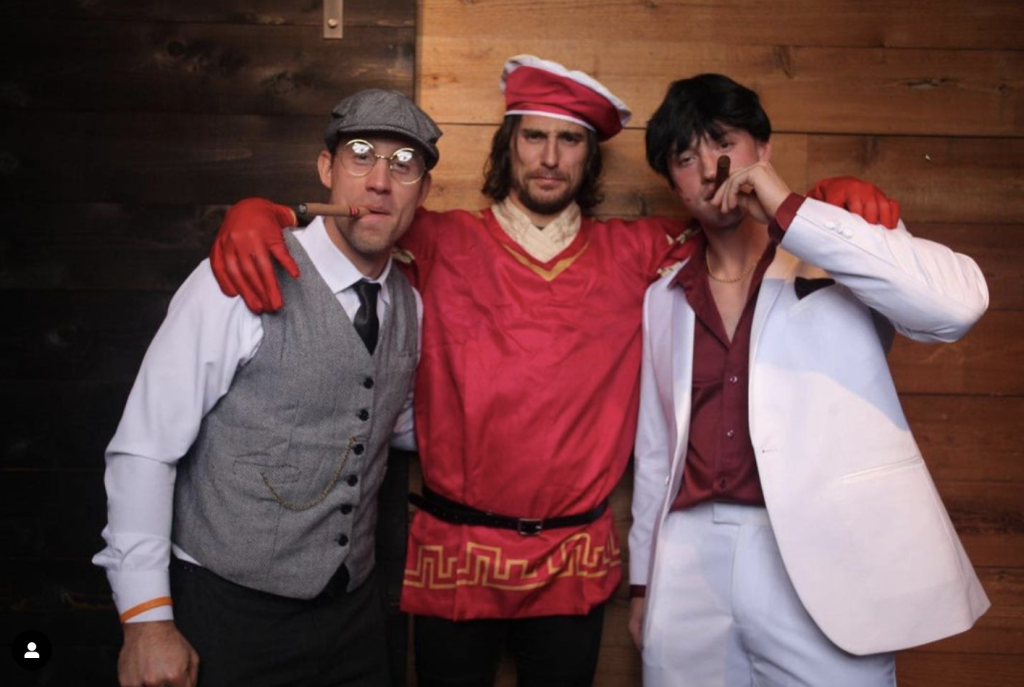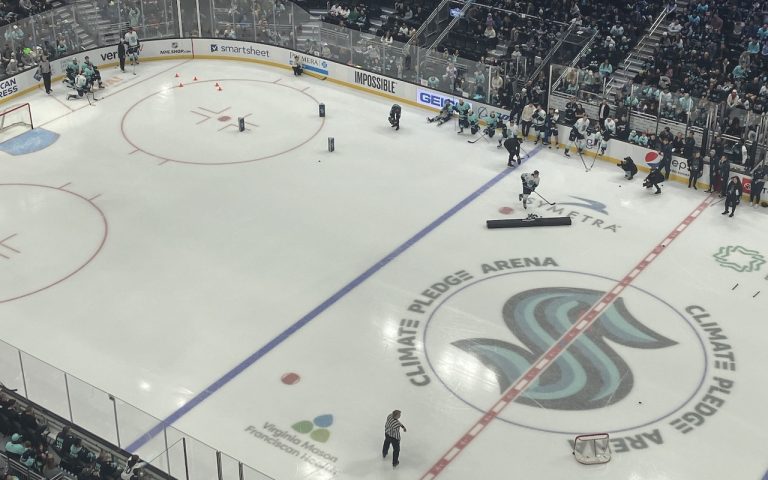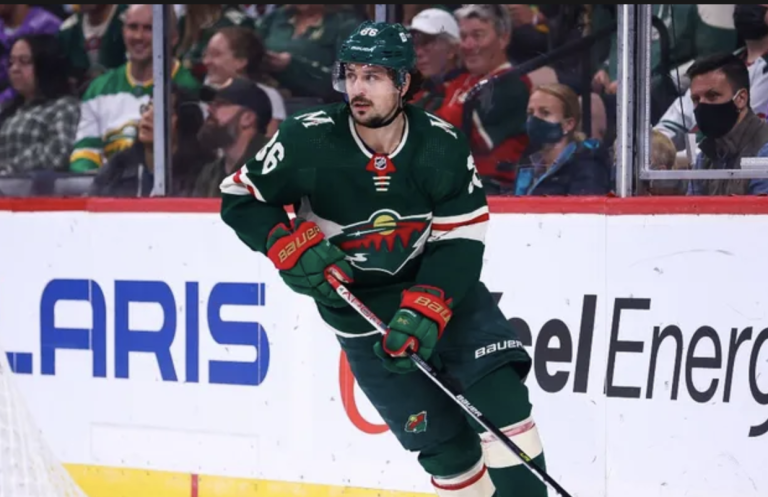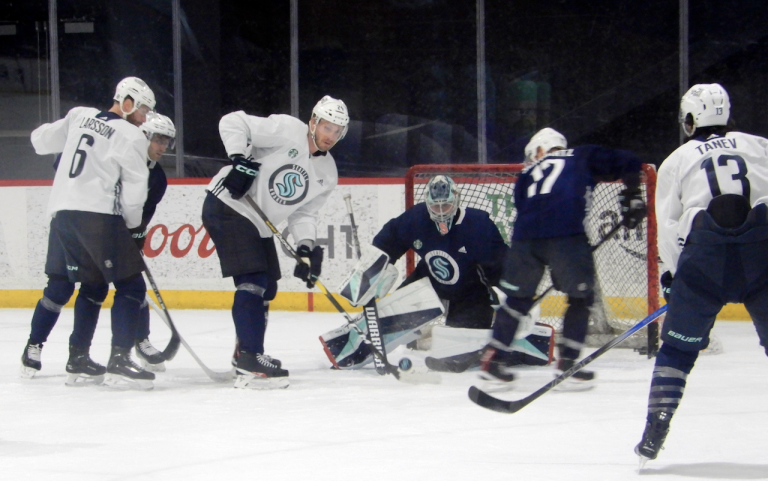A Week Of Kraken
The latest “Simmer and Forslund” podcast with yours truly and John Forslund talking Seattle Kraken hockey has dropped, available via this link or at the bottom of this page after you’ve caught up on all of the other tantalizing puck tidbits.
As always, this week’s edition is a solid education on the Kraken and what’s happening under the surface. Enjoy!
Simmer’s Sunday 9:
1) “Jumbo” Joe Thornton retired this past week, considered one of the greatest players never to win a Stanley Cup. He definitely gave it all he had, 24 seasons and 1,714 regular season games, which is 6th all time on the NHL games-played list. By the way, the man 14 games ahead of him on that list is Kraken GM Ron Francis.
The closest Thornton came to the chalice was with the San Jose Sharks in 2016 when they lost the Stanley Cup Final to the Pittsburgh Penguins in six games.
Thornton was also involved in one of the more famous trades in NHL history, essentially known as “the Joe Thornton trade” in late November 2006. I happened to be doing the Boston Bruins games on TV at the time when the club traded its captain to the Sharks for forwards Wayne Primeau and Marco Sturm and defenseman Brad Stuart.
I loved the trade.
(**The excerpt from one of my books that explains why I and a few others loved it can be found at the very bottom of this page below the podcast video.)
Jumbo was a cool cat with kind of a laid back, surfer dude approach, not so much captain material. The kind of guy who would head to the beaches of southeast Asia during the off-season.
He was also cool enough years later to join me for some radio shtick and mock the big trade by saying for a segment: “You know what the best part of the Joe Thornton trade was, my hair, it looked fabulous in the photos that day.”
Great guy and a lock first ballot Hockey Hall of Famer.
2) One of the brief asides we chat about this week on the podcast is the term “unanswered goals”, maybe one of the most often misused in sports. Consecutive goals are not necessarily “unanswered”. If a team scores four consecutive goals and the opposition scores a goal later, they’re not unanswered.
An executive complained to me about this once or twice, obviously just for fun, but he brought up a great point.
A classic example would be the Vancouver Canucks scoring ten goals the other night in San Jose before the Sharks scored their only goal, the last one of the game.
Those Canucks goals were a lot of things; consecutive, impressive and embarrassing, but they weren’t unanswered.
3) John Forslund is one of the preeminent play-by-play voices in hockey. The Kraken honored him with a bobble-head giveaway on Thursday night. 10,000 of them were given out to happy fans.
4) Speaking of preeminent, our pal Elliotte Friedman of Sportsnet TV in Canada is one of the top NHL “insider” reporters. He also hosts an excellent “32 thoughts” podcast with our friend Jeff Marek every week.
Elliotte was ornery starting this past week’s edition, stating …
“I am in a foul, pissed off mood.”
“Why, why are you so sour,” Jeff inquired.
“There was something I wrote that got twisted, and it actually has real world consequences, and some people were told things that I never said. So I’m in, I’m in a foul mood today.”
I’m happy for Elliotte that he’s reached a position where he can vent his frustration, later joke about it with Jeff, and essentially brush it off.
Me, not so lucky. Let’s just say I could repeat those exact words over and over, but I’m still on day 402 of a ban from the Canucks press box. Complete, unjustified nonsense, and there’s a very good chance you’ll be hearing a lot more about it (again) in the not-so-distant future.
Oh yeah, and as you might expect, I’m just fine and utterly welcome to visit my friends and cohorts with the other 31 NHL clubs.
5) Quick little social media stop from last week with Brandon Tanev’s instagram.
Jaden Schwartz, Tanev and Vince Dunn decked out for Halloween.

6) Trivia time:
How many members of the Olczyk (“Ohl-check”) family work for or with the Kraken?
A) 5, B) 4, C) 3, D) 2, E) 0, it’s not their real name.
Answer at bottom, above the podcast video.
7) John Forslund’s discussion/answer regarding Matty Beniers “sophomore slump” and a potential solution is one of many good reasons to listen to the podcast.
8) Although we can often presume who the Kraken’s starting goaltender is, via logic, or by which goalie is standing in the “starter’s crease” at morning skate, Kraken head coach Dave Hakstol prefers not announcing the name of his starter at his game day, morning skate media availabilities.
He is among a handful of NHL coaches that choose the mums-the-word approach regarding netminders. Out of curiosity, I asked him why. Keep the opposition guessing in terms of scouting the game? Routine? Superstition?
He gave a straightforward answer as he does way more often than not.
“There’s a purpose to it,” he said. “We have two goaltenders that are quite different in their approach to the game, so, everybody watches morning skate, I don’t think much is hidden, but I don’t see the point in me standing in front of everybody confirming something that doesn’t help us in any way, it only helps our opponent.”
Fair enough. And way nicer than Torts’s (John Tortorella’s) answer about ten years ago.
9) Bobby Hull was renowned in his day for having the hardest slapshot in hockey. Number-9 for the Chicago Blackhawks had his shot clocked in a game at a record 118.3 miles per hour. Seemingly impossible, but according to some, his wrist shot was just as wicked.
“The Golden Jet” could skate more than 29-miles per hour.
Trivia Answer: The answer is B. 4.
Eddie, the former NHL player and coach, is the color commentator on Root Sports when he’s not doing national games, his son Nick is on Root Sports as an intermission analyst, his other son Eddie III is an amateur scout for the club and his younger brother Ricky is the team’s Vice President and Assistant General Manager.
The Podcast:
An excerpt from 2018’s “No Heavy Lifting – Globetrotting Adventures of a Sports Media Guy”, from a chapter entitled “The Italian Job”.
The context: covering hockey for NBC at the 2006 Winter Olympics in Torino.
—
Recent Bruin, turned San Jose Shark, NHL star Joe Thornton, drew plenty of interest. Despite the general media frenzy around Thornton and his high-profile trade, I didn’t pay that much attention. Not a big fan of his overall demeanour towards winning and losing during our brief time together in Beantown, and a strong proponent of “The Joe Thornton Trade,” I didn’t really follow or approach “Jumbo” during his mixed-zone visits. I think I grabbed some audio from him on only one occasion at the Games.
Less than three months had passed since his trade, which had rocked the hockey world. I went into the Bruins dressing room post game, as I always did, the night of November 29, 2005, in New Jersey.
Thornton had lost a defensive zone draw to Devils centre John Madden in the final minute of regulation. Madden won the puck cleanly, flipped it over to Alexander Mogilny, who ripped a shot past Boston goalie Andrew Raycroft for the game winner. The Bruins had blown a 2–0 lead and now had a three-game losing streak. They had lost nine of ten, having just recently ended a six-game losing streak in Toronto.
I’ll never forget the interview Thornton did with two writers and myself after the loss, and this after getting burned on the face-off. We were crammed just inside the visitors’ dressing room door, and somewhat rushed, as the team hastily prepped for the post-game charter flight home.
“We’re fine, we’ll be OK,” Thornton repeated. I knew some surfer dudes from five years of living in Hawaii, but the hockey man in me, and the hockey reporter in me, watching this team flail in the early season, didn’t appreciate the beachy response. Dude, we’re fine.
Yes, as captain, he was generally always willing to talk post game, which is commendable, but the mantra was far too routine, far too casual, and never laced with urgency. After the loss to the Devils, his response seemed unfathomable to me.
The next night, a Wednesday, I was out with my assistant, Abby, at The Druid pub in Cambridge, Massachusetts, down the street from where I lived that season. NESN showed up on my caller ID.
“What the hell, Abby, it’s NESN. I’d better take this.” I stepped outside the noisy bar to hear SportsDesk coordinating producer Rob Wallace’s voice on the other end of the line.
“Simmer, where are you?” he asked.
“In Cambridge. What’s going on?”
“The Bruins just traded Joe Thornton,” he declared. He allowed just enough time for me to recover my jaw before he followed up with, “Can you come in?”
Uh oh. I was conflicted. Of course I was interested in the opportunity to jump on SportsDesk live with anchor Hazel Mae to handle this gigantic sports story. But I was also two or three glasses of wine deep. I was buzzed, and, besides, I wasn’t really confident I could bring any significant historical perspective to Thornton’s tenure in Boston. I was only twenty-six games into my first season with the Bruins.
I weighed the benefits and the potential pratfalls of going on the air or not going on the air, and made the right decision. I’d been around the business long enough to know that the factors working against me, especially the wine buzz, could do great harm to my career, while the potential downside of not going on the air that night hardly existed. My decision was made even easier knowing that NESN had the option of calling on Kevin Paul Dupont, Hockey Hall-of-Fame honored writer for the Boston Globe, as an analyst to break things down.
I loved the trade from the get-go and was clearly in the minority when I said so. From the perspective of leadership and chemistry, I felt the Bruins had been treading water. They needed what some refer to as a change in culture. Thornton could pile up points all he wanted, but the Bruins would never win a Cup with him as captain. And they didn’t.
Boston General Manager Mike O’Connell traded Jumbo to the Sharks for speedy German winger Marco Sturm, stalwart defenseman Brad Stuart, and a third-line centre, Wayne Primeau. The fans went nuts, the reporters who behaved like fans went nuts, but to many in the hockey world, the reasoning was clear.
“O.C.,” as O’Connell was known, went through hell. The Boston fans ripped him and chanted for his dismissal at games. The former first overall pick in the 1997 draft, Thornton was one of those “homegrown” Bruins that Boston hockey fans loved. They felt betrayed. Making it worse, Thornton went on to win the Hart Trophy as League Most Valuable Player in 2006, the first time a player traded midseason had ever done so.
Small picture, short view, a tough pill to swallow; big picture, long view, trading Thornton was the best thing the Bruins could have done in the new millennium. Among other things, the salary cap space he freed up allowed for the long-term signing of future Cup champion, Captain Zdeno Chara.
“Yeah, well, don’t be surprised if the Bruins win a Stanley Cup before the Sharks do,” I said more than once. I’m a staunch believer in four essential factors in the sport of hockey, with its firehouse mentality requiring everyone fully on board for one another; they’re what I call the 4-Cs: coaching, chemistry, commitment, and character. As an observer, I was convinced the Bruins didn’t have them all with Thornton, and that his change of scenery would do everyone a world of good.
O’Connell lost his job with eleven games remaining in the regular season. Head coach Mike Sullivan lost his job during the summer. The men allegedly responsible for the horrible pre and post lock-out player personnel strategy that actually led to the dysfunctional roster and the shitty record, owner Jeremy Jacobs and his senior advisor, the man who regularly followed his orders, Harry Sinden, of course lived to see another day.
Jacobs let all of his impending free agents walk before the autumn 2004 lock-out, an event that the cost the NHL and it’s fans an entire season. He had structured and timed contracts to expire before the work stoppage, an event he apparently strategized and orchestrated with NHL Commissioner Gary Bettman, an event everyone knew was coming three years in advance. The 2004-2005 owner’s lock-out was utterly premeditated in an effort to secure a salary cap system of player revenue control for the League. But instead of a swath of free agents being available on the cheap, that the Bruins had hoped for coming out of the work stoppage, instead, they were left with scraps.
Boston scrambled to fill the roster they had gutted, by signing an aging Alex Zhamnov who missed most of the next season with a broken ankle, role player Dave Scatchard, limited power forward Brad Isbister, Brian Leetch, a great leader and Hall of Fame player on his last legs, and former Bruin Shawn McEachern, in a desperate August 2005 signing binge.
By the way, before he was fired, O.C. also traded the Bruins other 1997 first rounder, eighth overall pick, Sergei Samsonov, who actually won the Calder Trophy as rookie-of-the-year in he and Thornton’s first season. “Sammy” was an undersized left wing with great hands who had reached his ceiling, and was moved to Edmonton for Marty Reasoner, Yan Stastny, and a second round pick that turned out to be future Stanley Cup winning core player Milan Lucic.
Not only did Boston go on to win the Cup before San Jose, who has yet to win one, but O’Connell eventually got his name on the silver chalice as well. In fact, he did it twice, as an executive in the hockey department with the Los Angeles Kings. The Sharks, coy, almost mocking of the Bruins and O’Connell at the press conferences following the Thornton deal, have been consistent playoff failures. In the summer of 2014, they actually stripped Thornton of his team captaincy. In 2015 they failed to make the postseason.




Great stuff